On & Off the Hill
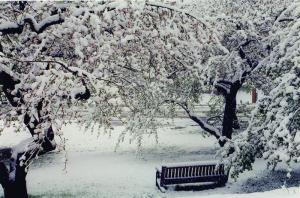 Newsy articles from Marlboro and around the world, including a fond farewell to history professor Tim Little, a report from students in China, a class in community-based performance and a new professor of ceramics, Martina Lantin.
Newsy articles from Marlboro and around the world, including a fond farewell to history professor Tim Little, a report from students in China, a class in community-based performance and a new professor of ceramics, Martina Lantin.
Tim Little takes a bit of Marlboro history with him
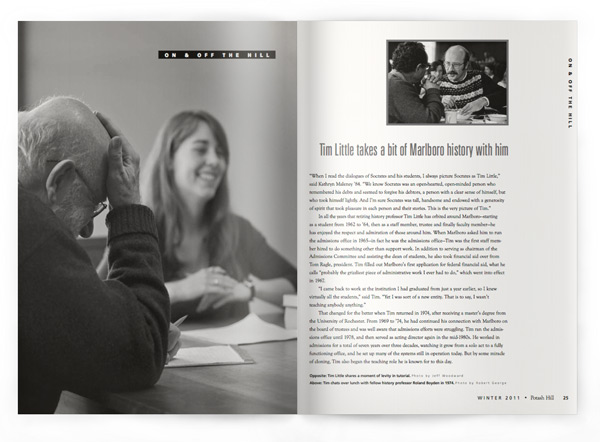
“When I read the dialogues of Socrates and his students, I always picture Socrates as Tim Little,” said Kathryn Maleney ’84. “We know Socrates was an open-hearted, open-minded person who remembered his debts and seemed to forgive his debtors, a person with a clear sense of himself, but who took himself lightly. And I’m sure Socrates was tall, handsome and endowed with a generosity of spirit that took pleasure in each person and their stories. This is the very picture of Tim.”
In all the years that retiring history professor Tim Little has orbited around Marlboro—starting as a student from 1962 to ’64, then as a staff member, trustee and finally faculty member—he has enjoyed the respect and admiration of those around him. When Marlboro asked him to run the admissions office in 1965—in fact he was the admissions office—Tim was the first staff member hired to do something other than support work. In addition to serving as chairman of the Admissions Committee and assisting the dean of students, he also took financial aid over from Tom Ragle, president. Tim filled out Marlboro’s first application for federal financial aid, what he calls “probably the grizzliest piece of administrative work I ever had to do,” which went into effect in 1967.
“I came back to work at the institution I had graduated from just a year earlier, so I knew virtually all the students,” said Tim. “Yet I was sort of a new entity. That is to say, I wasn’t teaching anybody anything.”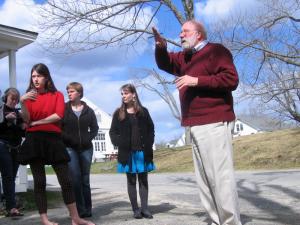 That changed for the better when Tim returned in 1974, after receiving a master’s degree from the University of Rochester. From 1969 to ’74, he had continued his connection with Marlboro on the board of trustees and was well aware that admissions efforts were struggling. Tim ran the admissions office until 1978, and then served as acting director again in the mid-1980s. He worked in admissions for a total of seven years over three decades, watching it grow from a solo act to a fully functioning office, and he set up many of the systems still in operation today. But by some miracle of cloning, Tim also began the teaching role he is known for to this day.
That changed for the better when Tim returned in 1974, after receiving a master’s degree from the University of Rochester. From 1969 to ’74, he had continued his connection with Marlboro on the board of trustees and was well aware that admissions efforts were struggling. Tim ran the admissions office until 1978, and then served as acting director again in the mid-1980s. He worked in admissions for a total of seven years over three decades, watching it grow from a solo act to a fully functioning office, and he set up many of the systems still in operation today. But by some miracle of cloning, Tim also began the teaching role he is known for to this day.
Tim relished the opportunity to teach with history professor Roland Boyden, his Plan sponsor and mentor in so many ways. Roland was the first faculty member ever hired and was also the first dean of the faculty. Roland’s daughter Rachel Boyden ’79 remembers Tim coming to their house in Cambridge to work on his Plan when her father was on sabbatical, in 1964. “Tim is a link to the early years of Marlboro,” she said. “It will certainly make the whole experience of history at the college different when he retires.”
“Tim offered the yang to Roland’s yin,” said Peter Mallary ’76, one of Tim’s first Plan students and father of Rebecca Mallary ’11, one of Tim’s final Plan students. “Where Roland was economical, Tim was expansive. While both were generous with their time and teaching, the first was an introvert and the second a decided extrovert. Tim has an openness—particularly with students—that is infectious. There is always a story or an observation of a curious, amusing and sometimes trenchant sort. He is a gifted raconteur.”
“Because it suited me to do it this way, and Roland did it this way, if a student came to me with an interest that was historical, I would be willing to work with that student if I could be persuaded that he or she would work hard too,” said Tim. “The fact that I knew as little about it as they did at the beginning couldn’t prevent us from getting somewhere. I’ve very seldom been let down. I’ve had some wonderful students over the years.”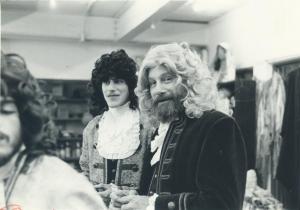 Jeff Bower ’92 credits Tim with helping him learn how to learn. “Tim is the very quintessence of Marlboro College,” he said. “Here is a man capable of sharing a great breadth and depth of knowledge within his field while at the same time allowing students to learn along their own path. He guided without boundaries, encouraged the articulation and development of ideas and presented cause and effect, while at the same time realizing that the linearity with which history is sometimes presented is never how history actually happens.”
Jeff Bower ’92 credits Tim with helping him learn how to learn. “Tim is the very quintessence of Marlboro College,” he said. “Here is a man capable of sharing a great breadth and depth of knowledge within his field while at the same time allowing students to learn along their own path. He guided without boundaries, encouraged the articulation and development of ideas and presented cause and effect, while at the same time realizing that the linearity with which history is sometimes presented is never how history actually happens.”
Although Tim began in European history, his interests were continually broadened by his students’ interests and by collaborations with other faculty members. He covered Asian history with some students, Native American history with others, and “gaily danced into” lots of Anglo-American history working alongside American studies professor Dick Judd. “As it became more and more evident that history was being written and discussed on a broader and broader scope, it wasn’t so unusual that I should go into world history,” said Tim. “Everybody was doing it, and Marlboro was building up to the World Studies Program. It made sense in a way that it really didn’t before.”
“Tim gave me a new perspective on how to ‘read’ history—an important tool for critical thinking,” said trustee Sara Coffey ’90. Sara was one of the first students in the World Studies Program, and, because she started midyear, had to take the first semester of the required World History and Cultures as a tutorial with Tim. “I still see him engaging with students with the same generosity that I experienced. He has not lost that mischievous sparkle either.”
The launching of the World Studies Program had a particular sparkly significance for Tim that he didn’t know at the time, as it brought in cultural history and Eurasian studies professor Dana Howell, whom he married a few years later. “Dana and I worked well together. We taught this huge class together for World Studies, which involved grading papers and spilling all sorts of things.”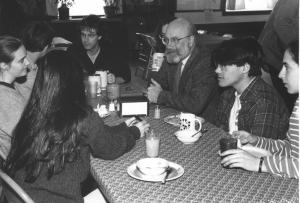 Over the years, Tim has always embodied the community spirit at Marlboro. He was a highly respected Town Meeting moderator and led a “breakfast club” chat in the dining hall every morning he was on campus. He was also a devoted emcee for the annual day-care bake sale, according to Gina DeAngelis ’94, who wrote the script for him one year.
Over the years, Tim has always embodied the community spirit at Marlboro. He was a highly respected Town Meeting moderator and led a “breakfast club” chat in the dining hall every morning he was on campus. He was also a devoted emcee for the annual day-care bake sale, according to Gina DeAngelis ’94, who wrote the script for him one year.
“He was far funnier off the cuff than anything I’d written,” said Gina. “He also ended up bidding on a cake I made, and the next day in the dining hall, he came up to me in front of a dozen people and sang my praises for five solid minutes: I was definitely, he said, no matter what other things I’d ever done, going to go to heaven, solely because of that cake. I will be forever grateful to him for his gentle guidance, his warm sense of humor and his unparalleled joie de vivre.”
Now with a little more time on his hands, Tim is looking forward to being with his three grandsons and reading the “piles and piles of things” he’s collected in case he found himself retired. He is also interested in getting certified to teach children to read, and understands that there is a demand for older men in that field. “Sometimes the students get cranky with their female teachers, and an old, grim-looking man like me will give some gravity to it.”
For many years Tim has been working on writing a history of Marlboro College, and it is hard to imagine a person better equipped in aptitude and experience to do so. “The problem is that every time I sit down to write a history I end up writing a memoir,” said Tim. “And when I say, oh hell, I’ll just write a memoir to get it out of the way, the history keeps intervening again.” We await both with great anticipation.
Language students find context in China
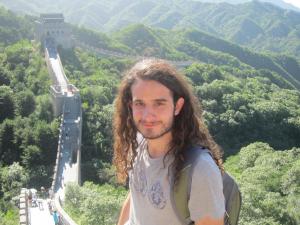 “I felt like an expatriate, like Hemingway or some other Lost Generation type in Paris,” said junior Casey Friedman, referring to his trip to China with four other Marlboro students last summer. “There I was with a small band of my countrymen, surrounded by a foreign world into which we didn’t quite fit. And it was magnificent.”
“I felt like an expatriate, like Hemingway or some other Lost Generation type in Paris,” said junior Casey Friedman, referring to his trip to China with four other Marlboro students last summer. “There I was with a small band of my countrymen, surrounded by a foreign world into which we didn’t quite fit. And it was magnificent.”
The students joined Chinese language professor Grant Li for six weeks at the International Cultural Exchange School at Changchun University, in Jilin Province, thanks to support from the Freeman Foundation Undergraduate Asian Studies Initiative. Every morning they had Chinese classes with other students at the school, most of them from Korea and Russia, and in the afternoon they enjoyed cultural activities ranging from kung fu and calligraphy to making dumplings.
“The experience was more about the culture than the language,” said Grant. “Language is a gradual thing, and the instruction was hard for them because the teachers never spoke English. But culturally, you can see the way of life right away. They lived there. They learned where to go, what people were doing.”
The students became adept at ordering food at restaurants, haggling with shop-owners, navigating around Changchun and crossing busy streets seemingly against all odds. “People there have a very different approach to obeying traffic laws,” said sophomore Chad Daniels. “Also, taking Chinese public transportation has totally redefined my understanding of ‘personal space’; entering and exiting buses and subways can sometimes literally mean climbing over 10 or so people.”
The program left room for the students to explore the city on their own and get to know some of the Russian and Korean students who shared their classroom, many of whom spoke English. Grant fondly remembers junior Nick Stefan challenging one of the many men who play Xiangqi, or “Chinese chess,” on the street to a game, and beating him. “I don’t usually play with the people on the street because it’s hard for me to beat them.” said Grant. 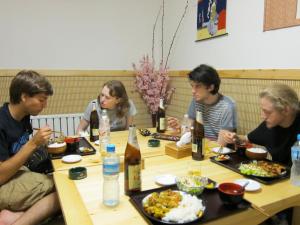 Each student took away valuable experiences that will be integrated into their course of study at Marlboro. For sophomore Megan Reed, experiencing the Chinese language on its own turf ties into her interest in language as a whole. “I’m studying theoretical linguistics, which looks past the basics of language and dives more directly into the foundation of all languages. So knowing more than one language can help to prove points in this field.”
Each student took away valuable experiences that will be integrated into their course of study at Marlboro. For sophomore Megan Reed, experiencing the Chinese language on its own turf ties into her interest in language as a whole. “I’m studying theoretical linguistics, which looks past the basics of language and dives more directly into the foundation of all languages. So knowing more than one language can help to prove points in this field.”
For junior Mike Ulen, who is interested in exploring Chinese folk crafts, especially woodworking, the trip helped put his Plan of Concentration into perspective. He said, “It enhanced my Chinese and made it easier to learn more about China via the vehicle of its own language, which is incredibly important.”
Students take performance off the hill
“I think having performances that celebrate, educate, question and inspire communities is critical to keeping those communities vibrant and alive,” said Jodi Clark ’95, assistant director of youth initiatives at Monadnock Family Services in Keene, New Hampshire. “All cultures I can think of have some means of performance that fulfills the need for these kinds of cultural reflections.” Jodi coordinates ActingOut, an issue-oriented teen theater program where three Marlboro students had internships this fall as part of a class called Community-Based Performance.
“Community-based performance challenges participants to immerse themselves in the communication of experience,” said Ken Schneck, dean of students, who taught the class. “This isn’t about boxing in the artist as a solitary genius, but is instead rooted in that which happens collectively: Individuals interact with a group of people with some shared identity, and this lived experience then informs the art, further developing the sense of community.”
This was amply demonstrated by Kevin and Erin Maile O’Keefe, founders of CircusYoga, who worked with the class on community performance exercises they call “kinesthetic play.” Their collaboration with the students culminated with an evening of lively dancing in the streets of Brattleboro during the town’s “gallery walk,” where they invited other community members to join in.
“We like to find activities that kind of level the playing field,” said Erin. “It doesn’t matter what language you came into the world with, it doesn’t matter what your culture is, because together we’re going to co-create culture through play.”
In addition to ActingOut, students interned at Mahalo Art Center, the Theater Adventure Program (TAP) at New England Youth Theater, and Sandglass Theater, directed by former visiting faculty member Eric Bass. 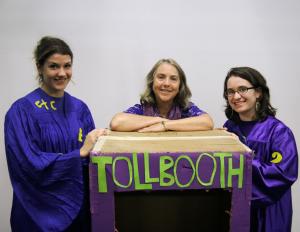 “We walked in and were thrown into the fire right away,” said sophomore Samantha Hohl, who interned at TAP, a theater program for children, youth and adults with disabilities directed by Laura Lawson Tucker ’77. “We were amazed at how Laura can incorporate herself into everything and maintain control on so many levels. It works really well for how crazy it is.”
“We walked in and were thrown into the fire right away,” said sophomore Samantha Hohl, who interned at TAP, a theater program for children, youth and adults with disabilities directed by Laura Lawson Tucker ’77. “We were amazed at how Laura can incorporate herself into everything and maintain control on so many levels. It works really well for how crazy it is.”
“I think these internships will help students broaden their worldview beyond their studies and beyond ‘being on the hill,’” said Laura. “My hope is that they will go out into the world understanding how critical it is that the arts are offered within a community, in order to give all a voice, as well as the power of theater to strengthen and frame a community and its members.”
“Ken’s class provides such a rare opportunity to take advantage of this arts-rich region and to truly see some of the places where the strength of our greater Brattleboro area comes from,” said Jodi. “Having hands-on knowledge, observing or participating in these various community organizations, and feeling firsthand the power of their art is one of the best sorts of learning experiences.”
New faculty member broadens ceramics program
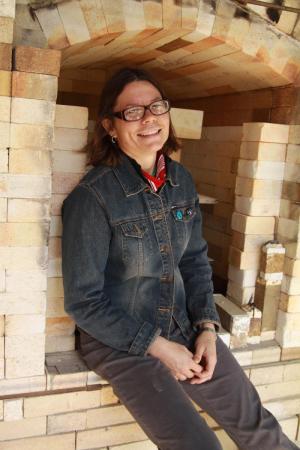 “I am on the cusp of changing my palette of glaze colors—I’m hunting for a good deep purple,” said Martina Lantin, Marlboro’s new ceramics professor. That’s not all that’s changing in the ceramics program, as Martina brings a refreshingly broad practice and perspective into the studio that fits in well with Marlboro’s visual arts program.
“I am on the cusp of changing my palette of glaze colors—I’m hunting for a good deep purple,” said Martina Lantin, Marlboro’s new ceramics professor. That’s not all that’s changing in the ceramics program, as Martina brings a refreshingly broad practice and perspective into the studio that fits in well with Marlboro’s visual arts program.
“In art there’s so much emphasis placed on the original idea, or the original work, that I think young people are often reluctant to look more broadly at what has come before,” said Martina. “I think it’s important to start training students to look at other work, and look at it critically: not just what this artist has done, but where their inspirations come from and whether their artist’s statement actually matches what they’ve achieved.” She knows that ceramics is about engaging one’s mind as well as one’s hands, and her classes incorporate research projects and critiques to establish each student’s own conceptual development and vocabulary.
“I see ceramics, and all art-making, as integral to a liberal arts curriculum,” said Martina. “Ceramics combines chemistry, physics and artistic expression, for example. It takes care and attention to craft, and the determination to develop skill is akin to learning the art of writing and critical thinking.”
Martina has an M.F.A. from Nova Scotia College of Art and Design University, but her knowledge of ceramics has been broadened by numerous international experiences, including an apprenticeship in England and graduate study in Denmark. She also worked as a production potter, and favorably compares the community environment at Marlboro to communal studios she has worked in. She likes that the individualized learning paradigm at Marlboro allows her to explore alongside her students.
As far as her own work, Martina draws inspiration from aspects of material culture and the story of how populations have moved around the globe through history. She has had shows across the United States and in Canada, and is represented in several galleries. In 2010 she received an artist fellowship from the Tennessee Arts Commission and was featured in the October issue of Ceramics Monthly.
“I am always striving to develop new forms in the studio, and have been fascinated with ‘flower bricks’ [vases that hold several separate stems] in the past year—they offer a unique connection to ceramic history as well as the dual potential of utilitarian and decorative functions.”
While the divide between functional and sculptural sometimes runs deep in the ceramics world, Martina is one of many modern ceramists who are challenging the centuries-old aesthetic that anything useful cannot also be beautiful. One of the things that attracted her to Marlboro was that the college was looking for a “vessel maker.” This implied a strong commitment to the craft tradition, or functional ceramics, which is uncommon in an art discipline dominated by sculptural ceramics.“I try to disengage from that professional debate of art versus craft,” said Martina. “In the same way that I see ceramics as just as academically rigorous as any other course here at Marlboro, I think ceramics is as aesthetically valid as any other form of visual art. It’s really exciting to know that functional ceramics is fostered and seen as being important here.”
Martina is enjoying working with the other visual arts faculty to integrate their curriculum and build on their mutual strengths, creating a diverse and dynamic program. “When I consider my colleagues Cathy Osman and Tim Segar and John Willis, I can imagine myself complementing their approach to teaching and individual aesthetics.”
To see more of Martina’s work, go to her website at www.mlceramics.com.
Events put the world on stage
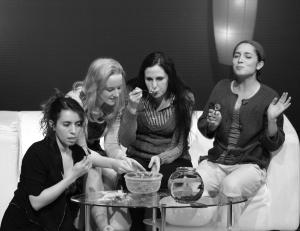 Whittemore Theater was buzzing this fall with a variety of dramatic events, both homegrown and from afar, comic and tragic. In September, for a second year, the Marlboro community welcomed Castle Theatre Company, the official theater company of University College, Durham, in the United Kingdom. The company, composed of talented students and graduates of Durham, rendered Shakespeare’s dark tragedy known as “the Scottish play.”
Whittemore Theater was buzzing this fall with a variety of dramatic events, both homegrown and from afar, comic and tragic. In September, for a second year, the Marlboro community welcomed Castle Theatre Company, the official theater company of University College, Durham, in the United Kingdom. The company, composed of talented students and graduates of Durham, rendered Shakespeare’s dark tragedy known as “the Scottish play.”
“Castle Theatre brought us an engaging, focused, streamlined rendition of Macbeth, featuring bold interpretive edges and lucid performances,” said Paul Nelsen, theater professor. “These British students have taken a real interest in Marlboro as well, and our hosting them gives us a chance for an invigorating exchange.”
Another highlight in September was a performance in the biennial Puppets in the Green Mountains Festival, presented by Sandglass Theater. This year’s participant was Colette Garrigan, from Normandy, France, with an imaginative shadow puppet performance of personal narrative, called Sleeping Beauty. “Puppets in the Green Mountains Festival offers students an opportunity to encounter international artists who present work outside familiar notions of conventional theater,” said Paul.
In October, film and video professor Jay Craven presented “Queen City Radio Hour,” a live performance of original comedy and music, recorded for future broadcast over Vermont Public Radio. This third edition of the variety show featured performances by senior Heather Reed, Amber Schaefer ’10, Gahlord Dewald ’98 and visiting music professor Charlie Schneeweis. Comic sketches included “Slender Pickins Rural Dating and Mating Service,” “The In-Laws Holiday Travel Bureau” and purportedly the only Vermont gubernatorial debate to include the word “giblet.”
Over the course of the semester, guest director Anna Bean worked with a crew and cast of Marlboro students in an exploration of Sarah Ruhl’s contemporary play The Clean House, presented at Whittemore in November.
“The Clean House is a comedy driven by issues of class and race,” said Anna, who received her doctorate in performance studies from New York University and edited A Sourcebook on African-American Performance. She chose Ruhl’s work partly because women playwrights are typically underrepresented in both professional theater and college programs. The Clean House also challenges cultural and language barriers. “Casting a play at a small college with a mandatory requirement that two main actors speak Portuguese and Spanish was risky, but I believe the ‘risk’ was worth the result: a play that lives in several cultural worlds at the same time.”
With experience teaching at Williams College and Wesleyan University, Anna was not disappointed by the caliber of cast and crew she found at Marlboro. “Working with them all has been a true joy because I did not have to set high standards—they already have and meet them in their lives as Marlboro students,” she said. “With so many stellar students dedicated to making intellectually stimulating theater, I hope the theater program will continue to be supported in bringing guest artists and teachers to campus.”
For more information about events on campus, theatrical and otherwise, go to www.marlboro.edu/news/events.See excerpts from the October 10 piano recital by Cynthia Raim, the first in this year’s Music for a Sunday Afternoon concert series honoring retired music professor Luis Batlle, at www.youtube.com/watch?v=op24I8bs7yc.
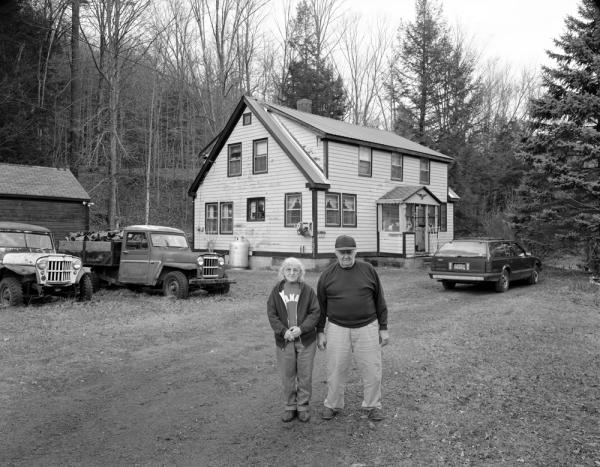 In October, an exhibit of photos by Forrest Holzapfel (son of David ’72 and Michelle ’73) and a talk by the artist highlighted the residents of Marlboro and the role of photographers in documenting local history. The traveling exhibit, called “A Deep Look at a Small Town,” was supported by the Vermont Folklife Center.
In October, an exhibit of photos by Forrest Holzapfel (son of David ’72 and Michelle ’73) and a talk by the artist highlighted the residents of Marlboro and the role of photographers in documenting local history. The traveling exhibit, called “A Deep Look at a Small Town,” was supported by the Vermont Folklife Center.
Worthy of Note
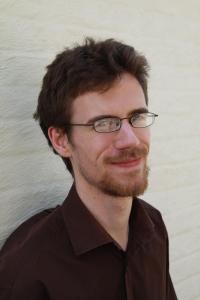 “Marlboro students are the keenest students I’ve ever known,” said classics fellow Will Guast, who joined Marlboro in September. Will received his B.A. in classics from Christ Church, University of Oxford, receiving honors and prizes for Latin language, verse composition and historical linguistics. In addition to his background in languages, he is interested in examining religion in the Roman world, particularly during the transition from paganism to Christianity. “What excites me most about Marlboro is freedom,” said Will. “The freedom to take complete control of a subject and design my own courses totally from scratch; the free-thinking and diversity of the student body; and the freedom of being in the middle of the green mountains, with miles of trails and countryside to explore.” He plans to pursue postgraduate study in classics back at Oxford on the papyrology of the Second Sophistic.
“Marlboro students are the keenest students I’ve ever known,” said classics fellow Will Guast, who joined Marlboro in September. Will received his B.A. in classics from Christ Church, University of Oxford, receiving honors and prizes for Latin language, verse composition and historical linguistics. In addition to his background in languages, he is interested in examining religion in the Roman world, particularly during the transition from paganism to Christianity. “What excites me most about Marlboro is freedom,” said Will. “The freedom to take complete control of a subject and design my own courses totally from scratch; the free-thinking and diversity of the student body; and the freedom of being in the middle of the green mountains, with miles of trails and countryside to explore.” He plans to pursue postgraduate study in classics back at Oxford on the papyrology of the Second Sophistic.
Did you know that lesbian, gay, bisexual and transgender (LGBT) students are two to three times more likely to use alcohol and other drugs than their straight counterparts? Neither did many college administrators before going to one of Ken Schneck’s talks at the regional conference of the National Association for Campus Activities. Ken was a featured speaker at the November conference, sharing the podium with other leaders in higher education administration. In addition to his talk, titled “Queers, Jeers and Beers,” Ken presented on creating programming for a new generation of students who expect administrators to know more than they usually do about LGBT students. “We spend so much time at these conferences focusing on LGBT 101, we lose sight of how some of the specific challenges faced by gay students directly result in increased risky behavior,” said Ken. 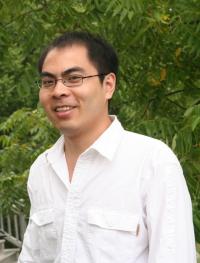 In August, Marlboro welcomed Yang “Louis” Liu, the new mathematics fellow. “The community here creates an excellent environment for teaching and learning,” said Louis, who received his bachelor’s degree in mathematics from Guangzhou University and his master’s from Sun Yat-sen University. He has been a teaching assistant at the University of Georgia, where he received his Ph.D. in mathematics in 2010, and a research assistant in both marine science and mathematics. Louis’ research focuses on random matrices and compressed sensing, but he is also interested in the mathematical modeling of aggregations of marine particles. “This is a great experience, teaching mathematics classes and advising students at Marlboro,” said Louis. “They are very self-motivated and have a breadth of knowledge across different disciplines.”
In August, Marlboro welcomed Yang “Louis” Liu, the new mathematics fellow. “The community here creates an excellent environment for teaching and learning,” said Louis, who received his bachelor’s degree in mathematics from Guangzhou University and his master’s from Sun Yat-sen University. He has been a teaching assistant at the University of Georgia, where he received his Ph.D. in mathematics in 2010, and a research assistant in both marine science and mathematics. Louis’ research focuses on random matrices and compressed sensing, but he is also interested in the mathematical modeling of aggregations of marine particles. “This is a great experience, teaching mathematics classes and advising students at Marlboro,” said Louis. “They are very self-motivated and have a breadth of knowledge across different disciplines.”
“I have long identified with the culture of ‘free inquiry’ associated with Marlboro College,” said Eileen Harney, who joined the college this fall as the Mellon Foundation–funded humanities fellow. “It is rewarding to be at an institution that promotes individuality and self-discovery among the student body while respecting and showing appreciation for the college’s own history.” Eileen received her B.A. in English from Boston College and her master’s and doctorate in medieval studies from the University of Toronto. Her interests in medieval literature and women’s and gender studies have guided her research on four female saints’ literary traditions across the medieval period. She has diverse experiences as a teacher, but finds the teaching expectations at Marlboro both challenging and exciting. “I am struck by how clearly invested Marlboro students are in their education,” Eileen said.
At the October meeting of the Consortium for Innovative Environments in Learning (CIEL), Sirkka Kaufman, assistant dean of academic affairs, participated in a panel discussion on applying results of the Wabash National Study of Liberal Arts Education. The Wabash study gathered evidence from dozens of institutions across the country to strengthen liberal arts education, but only a handful of those schools used innovative learning and assessment methods similar to Marlboro’s. Sirkka’s panel, which included presenters from New College of Florida, Alverno College, Prescott College and Hampshire College, described a data-sharing project using Wabash results to grapple with cross-institutional comparisons. “Our project stands to help put each institution’s learning outcomes into context and deepen our understanding of alternative practices and their likely effects,” said Sirkka. The panel conducted additional analyses prior to presenting again at the January meeting of the Association of American Colleges and Universities.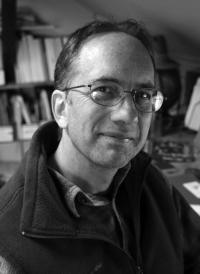 “Hornbills are uniquely tropical, uniquely visible even from a bike, and, well, just plain unique,” said Potash Hill editor Philip Johansson. His essay “Hornbills o’Plenty: Birdwatching by Bike in West Africa” was selected for inclusion in Wildbranch: An Anthology of Nature, Environmental and Place-based Writing, published by University of Utah press in 2010. The anthology is a collection of work from faculty and students of the Wildbranch Writing Workshop, held each summer for more than 20 years at Sterling College (current address of Will Wootton ’72, president), in Craftsbury, Vermont, and co-sponsored by Orion magazine. It also includes work of Alison Townsend ’75. “I take some credit for the success of the workshop because I attended the first one, I think, in 1988,” said Philip. “Hornbills o’Plenty” was based on his bicycle travels through Cote d’Ivoire, Ghana, Mali and Burkina Faso in 1993.
“Hornbills are uniquely tropical, uniquely visible even from a bike, and, well, just plain unique,” said Potash Hill editor Philip Johansson. His essay “Hornbills o’Plenty: Birdwatching by Bike in West Africa” was selected for inclusion in Wildbranch: An Anthology of Nature, Environmental and Place-based Writing, published by University of Utah press in 2010. The anthology is a collection of work from faculty and students of the Wildbranch Writing Workshop, held each summer for more than 20 years at Sterling College (current address of Will Wootton ’72, president), in Craftsbury, Vermont, and co-sponsored by Orion magazine. It also includes work of Alison Townsend ’75. “I take some credit for the success of the workshop because I attended the first one, I think, in 1988,” said Philip. “Hornbills o’Plenty” was based on his bicycle travels through Cote d’Ivoire, Ghana, Mali and Burkina Faso in 1993.
January marks the publication of retired literature professor Jaysinh Birjepatil’s new book, The Good Muslim of Jackson Heights, by Penguin (India). The fictional story of an aristocratic Muslim family that flees sectarian violence in their native central India, only to find reverberations in multiethnic urban America, Birje’s book traverses the tension between secular and religious. “Even though the central character in my book is a Muslim, I am not,” he said. “I was born in an upper caste Hindu family, but I lost all religion when I was packed off to a British boarding school in early childhood.” Birje says publication was delayed to assure that the book would not offend religious sensibilities, Muslim or Hindu. Meanwhile, Bennett & Spencer are publishing an American edition that will be available by the end of 2011.
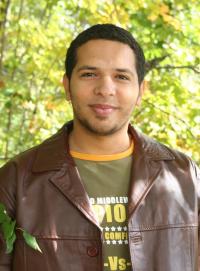 Ayman Yacoub joined Marlboro this fall as a Fulbright-supported foreign language fellow, the fifth to continue the Arabic language program. “Being a fellow at Marlboro offers me the experience of a new culture and a different educational system,” said Ayman, who comes from Egypt. “Compared to other students I have had, Marlboro students enjoy their lives and find balance between their academic needs and their special interests.” He received his bachelor’s in English from Al-Azhar University in Cairo, and also studied English at American University in Cairo and educational translation at Al-Azhar University. Ayman has been a volunteer teacher at an orphanage and is interested in history and poetry. After his fellowship he hopes to pursue research in the area of translation studies.
Ayman Yacoub joined Marlboro this fall as a Fulbright-supported foreign language fellow, the fifth to continue the Arabic language program. “Being a fellow at Marlboro offers me the experience of a new culture and a different educational system,” said Ayman, who comes from Egypt. “Compared to other students I have had, Marlboro students enjoy their lives and find balance between their academic needs and their special interests.” He received his bachelor’s in English from Al-Azhar University in Cairo, and also studied English at American University in Cairo and educational translation at Al-Azhar University. Ayman has been a volunteer teacher at an orphanage and is interested in history and poetry. After his fellowship he hopes to pursue research in the area of translation studies.
“Do our noses really contain a system for detecting and sorting molecular vibrations? A recent test of this theory suggests that they just might,” said chemistry and biochemistry professor Todd Smith in a September broadcast of the Northeast Public Radio show Academic Minute. “This is shaping up to be an interesting period in the history of smell.” Todd, who discussed recent breakthroughs in our understanding of smell, was one of four Marlboro professors who contributed to the show this year. In July, politics professor Meg Mott discussed the origins of Monopoly and its impact on American economic attitudes, and in August, philosophy professor William Edelglass explored moral responsibility and climate change. Literature professor Heather Clark took a fresh look at American poet Sylvia Plath in October. 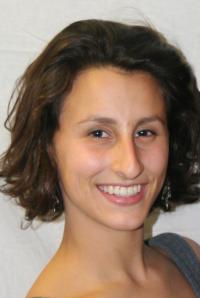 “I wanted a program that would not only enhance my ecological training, but would also integrate cultural learning into the equation,” said senior Jessica Stern. “Understanding the human dynamics, and how they clash and mesh with the environment, is just as important as understanding the basic ecological functions of a place.” Jess found all that and more on the School for International Training’s program on Tropical Forest Ecology, Biodiversity and Marine Ecosystems, which she calls “sort of a crash course through the different biological systems, regions and cultures in Panama.” In addition to developing her fluency in Spanish, Jess conducted research on the local uses of medicinal plants and their natural history, which will tie into her Plan of Concentration on ecology and ethnobotany.
“I wanted a program that would not only enhance my ecological training, but would also integrate cultural learning into the equation,” said senior Jessica Stern. “Understanding the human dynamics, and how they clash and mesh with the environment, is just as important as understanding the basic ecological functions of a place.” Jess found all that and more on the School for International Training’s program on Tropical Forest Ecology, Biodiversity and Marine Ecosystems, which she calls “sort of a crash course through the different biological systems, regions and cultures in Panama.” In addition to developing her fluency in Spanish, Jess conducted research on the local uses of medicinal plants and their natural history, which will tie into her Plan of Concentration on ecology and ethnobotany.
With an ardent interest in postwar peace-building and conflict resolution, social science fellow Gearoid Millar is not afraid of controversial issues, as exemplified by his class this fall called Anti-Disciplinarity: Responding to Social Complexity. “Together the students and I investigated the varying disciplinary approaches to youth violence and international development,” said Gearoid (pronounced gar-ROAD). “I certainly would not have gotten to teach this class at another university, and it is extremely exciting to see students struggle with the idea of social complexity and analysis.” He received his bachelor’s degree in political science and sociology from Florida Atlantic University and his master’s in international peace and conflict resolution from American University. Gearoid is currently a Ph.D. candidate in social science at the Maxwell School of Citizenship and Public Affairs at Syracuse University.
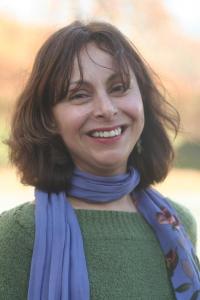 Last summer, Spanish professor Rosario de Swanson spent three weeks in the Dominican Republic, leading a language and literature program for promising students. It was her third year there, teaching a curriculum she designed as part of MACILE (Matemáticas, Ciencias y Lenguaje), a program dedicated to improving the quality of education for K–12 students in less advantaged communities. “I love seeing the eighth-graders discover things about their heritage they did not know, or hear their town mentioned in a historical source, or see their island in a map of the Americas,” said Rosario. “The look of wonder in their eyes is priceless.” Her travels to the Dominican Republic followed a college-funded research trip to Equatorial Guinea, the only African country where Spanish is the official language. In Equatorial Guinea, Rosario researched a paper on the nationally celebrated writer Juan Tomás Ávila Laurel.
Last summer, Spanish professor Rosario de Swanson spent three weeks in the Dominican Republic, leading a language and literature program for promising students. It was her third year there, teaching a curriculum she designed as part of MACILE (Matemáticas, Ciencias y Lenguaje), a program dedicated to improving the quality of education for K–12 students in less advantaged communities. “I love seeing the eighth-graders discover things about their heritage they did not know, or hear their town mentioned in a historical source, or see their island in a map of the Americas,” said Rosario. “The look of wonder in their eyes is priceless.” Her travels to the Dominican Republic followed a college-funded research trip to Equatorial Guinea, the only African country where Spanish is the official language. In Equatorial Guinea, Rosario researched a paper on the nationally celebrated writer Juan Tomás Ávila Laurel.
For more information on these items, go to the following websites:
Ken Schneckwww.naca.org/NSTspeakers.aspx
CIELwww.cielearn.org
Wildbranchwww.uofupress.com
Academic Minutewww.wamc.org/academic-minute.html
Rosario de Swansonwww.marlboro.edu/news/focus/rosario_dominican
Or for those of you who can’t get enough news of Potash Hill, check out Marlboro’s very own Facebook page at www.facebook.com/marlborocollege, our YouTube channel at www.youtube.com/user/MarlboroCollege#pand the Potash Phil blog at www.marlboro.edu/communities/alumni/blog.